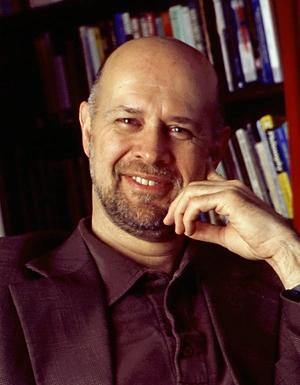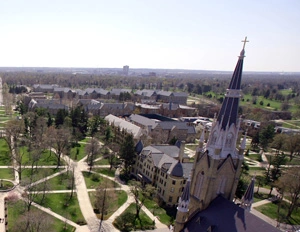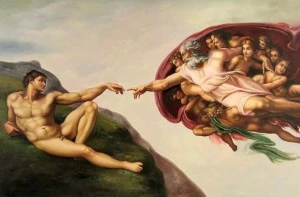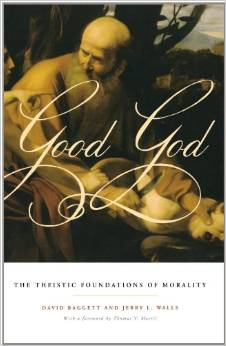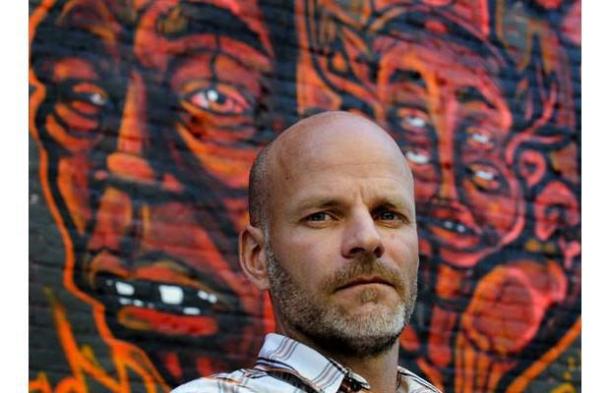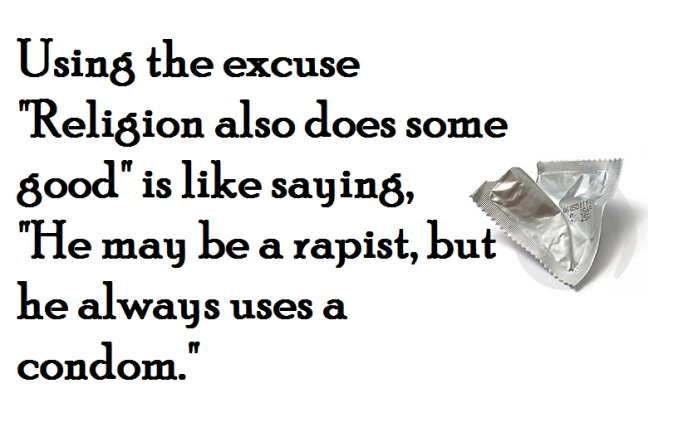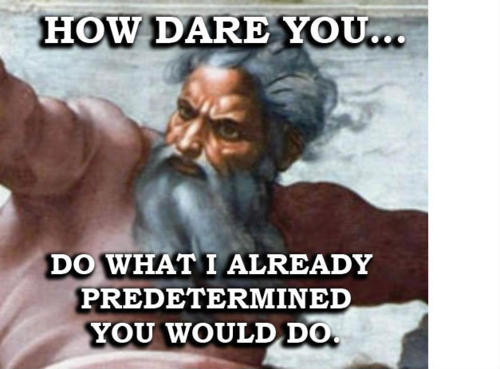Hell (understood as eternal torment) has been widely soon as Christianity’s most damnable doctrine by many atheists and skeptics. Very few people, however, ask themselves if that teaching can truly be found within the page of the Bible.
In what follows I interviewed Chris Date, a prominent proponent of the view of conditional immortality about this hot (if not burning) topic.

Lotharson: Hello Chris, thank you very much for having accepted my invitation.
Could you, for the benefit of my readers, sum up your personal and religious background?
Chris Date: Sure. I was raised without any influence to believe in God (that I recall), although I found out later in life that my parents both believe in Jesus Christ. While very young, I expressed fleeting interest in the Jehovah’s Witnesses and Mormonism, because family members and friends were among those groups. I also had some brief interest in Wicca as a teenager. Otherwise, however, I was an atheist into adulthood, and mocked Christians and Christianity. My now wife and I got married as atheists when I was 20, which was 14 years ago, and around 2 years later I became a believer in Jesus and quickly became interested in theology and apologetics. My wife was born again a few years later. I’ve been a software engineer at a prestigious Northwest software company for the past 12 years or so, though one day I hope to move into full-time ministry, or to become a University professor of Bible and theology.
I should say I also have four sons, ages 12, 8, 4, and 5 mos.
I really wish you will reach that goal 🙂
Eternal conscious torment and annihilationisn
Let us focus now on the topic of that interview.
What are (in a nutshell) the traditional doctrine of eternal conscious torment and annihilationism/conditional immortality?
The traditional doctrine of hell, or final judgment, or personal eschatology–however you want to put it–holds that the day is coming when all the dead will rise bodily from the graves, and those who have saving trust in Jesus Christ will spend eternity in the blissful presence of the Lord with the saints. Those who deny Jesus Christ, however, will be judged and punished according to their sins, which will entail an eternity of spiritual, psychological, and/or physical torment separated from God and his people. It’s important to emphasize that this is not a disembodied eternal state. The formerly dead bodies of the lost will have arisen, blood once again pumping, lungs once again expanding and collapsing, muscles once again flexing, etc. And it is in this immortalized body, incapable of dying, in which the lost will suffer for eternity somewhere in the physical universe. Annihilationism, on the other hand, more historically known as conditional immortality, is the view that immortality and everlasting life are not intrinsic to our nature, and that it is instead a gift which God gives only to those who have a saving relationship with Jesus Christ. Yes, we believe the lost will rise from the dead with the saved, but those who have not united themselves with the source of life will not live forever, but will instead die a second, permanent death–annihilation. Traditional “dualist” Christian annihilationists or conditionalists, who believe humans are comprised of an immaterial soul united with a physical body, would say that in the first death only the body dies, but that in the second death both body and soul will die (Matt. 10:28). Many other conditionalists are “monists” or “physicalists” who believe man is a physical creature who does not live in any sense while dead, and that their hope in an afterlife is found only in the resurrection. Either view–dualism or physicalism–is compatible with the biblical teaching that eternal life is a gift given only to the saved and that the risen lost will die a second death.
Thanks for your summary!
Mortal souls of the Old Testament
1) I think that a sound interpretation of the Bible should first seek to understand the oldest texts in order to interpret the most recent ones.
Critical scholars believe that many writers of the OT did not believe in an afterlife.
The dead do not praise Yahweh, nor do any that go down into silence. But we will bless Yahweh from this time on and forevermore. Praise Yahweh!
Psalm 115:17-18:
Turn, O Yahweh, save my life; deliver me for the sake of your covenant faithfulness.
For in death there is no remembrance of you; in Sheol who can give you praise?”
Psalm 6:4-5
What profit is there in my death, if I go down to the pit? Will the dust praise you? Will it tell of your faithfulness?
Psalm 30:9
Whatever your hand finds to do, do it with your might, for there is no work or thought or knowledge or wisdom in Sheol, to which you are going.
Ecc. 9:10
“The grave cannot praise you, death cannot celebrate you: they that go down into the pit cannot hope for your truth.”
Isaiah (38:18)
I personally find these passages extremely compelling.
How are those texts interpreted by Evangelical traditionalists and conditionalists?
Traditionalists would say that either those passages reflect a yet underdeveloped understanding on the part of the biblical authors, and that via progressive revelation the Lord revealed more about the afterlife in the New Testament, or they would say that they are talking mostly about goings on in this world, of which the dead will not have a part, without excluding conscious activity in another realm. Some conditionalists would say the same thing, particularly the dualist conditionalists I mentioned in answering your previous question. Other conditionalists, however, the physicalists or monists I mentioned, would say that these texts indicate that man is not conscious in death, that death is like a “sleep” in which one is unconscious. However, there are hints of an afterlife to be found in the Old Testament, hints pointing toward resurrection and eternal life. Definitely, though, whatever understanding and expectation they had of a future life was underdeveloped, and the New Testament provided more detail.

Divine threats in the old covenant
2) If eternal torment is far worse than a violent death, then why did not God clearly warn the Isrealites during the overwhelming majority of the OT time? Would it not be loveless and irresponsible to give them the impression that the wage of sin is “only” destruction?
Boy, I’m trying to put myself in the shoes of a traditionalist, and it’s tough. I’m not sure how one might answer that question. I suppose a traditionalist might say that the ancient readers of the OT understood “death” and “destruction” differently than we do, that they viewed it as some form of conscious separation, from one’s body or from one’s God, and so therefore they wouldn’t have necessarily ruled out the traditional view of hell. Traditionalists might further say that there are hints of the traditional view of hell to be found in the OT, such as in Daniel 12:2 and Isaiah 66:24 (neither of which supports their view, as perhaps we’ll see in a bit). And so in the interest of charity, I’m not prepared to concede that God would have been unloving and irresponsible in not fully revealing the traditional view of hell (if it’s true) in the OT; he may have done so more clearly than we moderns think. That said, it does seem clear to me that throughout the OT, the punishment for sin was seen as death, being cut off from one’s people and from life on earth. And eschatological punishment was seen in the same way, such as in the aforementioned passage in Isaiah in which God’s people are vindicated in the valley of Gehinnom when God slays his enemies and leaves their corpses to rot and smolder in fire. I would not say that the absence of the traditional view in the OT would make God unloving and irresponsible if it’s true, but I would say the fact that there is such an utter dearth of evidence for it in the OT, and an overabundance of evidence for conditionalism in it, that therefore my view is heavily favored.
Yeah precisely.
Unquenchable fires and dying worms
3) Quite a few passages in the Old Testament speak of an unquenchable fire consuming the wicked and of worms eating them.
““…rebels and sinners shall be destroyed together, and those who forsake the Lord shall be consumed. …you shall be like an oak whose leaf withers, and like a garden without water. The strong shall become like tinder, and their work like a spark; they and their work shall burn together, with no one to quench them” (Isa. 1:28, 30–31)
“But if you do not obey me to keep the Sabbath day holy by not carrying any load as you come through the gates of Jerusalem on the Sabbath day, then I will kindle an unquenchable fire in the gates of Jerusalem that will consume her fortresses.'”
Jeremiah 17:27
” 47 … Behold, I am about to kindle a fire in you, and it will consume every green tree in you, as well as every dry tree; the blazing flame will not be quenched and the whole surface from south to north will be burned by it. 48 All flesh will see that I, the Lord, have kindled it; it shall not be quenched.”
Ezekiel 20:47-48
“1 For behold, the day is coming, burning like a furnace; and all the arrogant and every evildoer will be chaff; and the day that is coming will set them ablaze … so that it will leave them neither root nor branch. 2 But for you who fear my name … 3 You will tread down the wicked, for they will be ashes under the soles of your feet on the day which I am preparing”
Malachi 4:1-3
“And they will go out and look on the dead bodies of those who rebelled against me; the worms that eat them will not die, the fire that burns them will not be quenched, and they will be loathsome to all mankind.” Isaiah 66:24
Likewise we find several references to the “gnashing of teeth” within the OT.
“The sinner shall see and be angry, he shall gnash his teeth and consume away” (LXX-Psalm 111:10″
“”All thine enemies have opened their mouth against thee. They hiss and gnash the teeth; they say, We have swallowed her up; certainly this is the day that we looked for; we have found, we have seen it (Lamentations 2:16).”
Many centuries later, Jesus used a similar language for describing the fate of the wicked.
“The Son of man shall send forth his angels, and they shall gather out of his kingdom all things that offend, and them which do iniquity; And shall cast them into a furnace of fire: there shall be wailing and gnashing of teeth (Matthew 13:41-42).”
“Luke 3:17
His winnowing fork is in his hand to clear his threshing floor and to gather the wheat into his barn, but he will burn up the chaff with unquenchable fire.”
The traditionalist claim is twofold:
a) Jesus saying can only be interpreted as meaning that the damned will be literally eternally tormented. Conservative Jews of His time only interpreted these passages in this way.
b) the OT itself refers to the destruction of the bodies of the wicked, but it is actually also a metaphor for their everlasting pain
Did I correctly characterize their position?
If so, does it hold water?
Chris Date: Well many traditionalists simply aren’t familiar with several of those OT references you mentioned. Their claim is that Isaiah 66:24’s unquenchable fire means a fire which will never die out, burning forever and ever, never consuming its fuel, and that its undying worm is a maggot which will forever have food to eat, never consuming its host. That host, in the minds of most lay traditionalists, is the living bodies of the lost in eternal torment in hell. Traditionalists more familiar with the debate recognize that that passage explicitly identifies the maggot’s host and the fire’s fuel as corpses, but as you suggest, they would say nevertheless that the unquenchable fire and undying worm can only be understood as promising everlasting torment in risen bodies in hell, by means of metaphor or analogy (since what Isaiah refers to are corpses, not living bodies). However, as you have noted, there are many passages in the OT in which unquenchable fire is used, and in the vast majority of them–certainly all the ones which are relevant to this question, since they involve the fiery wrath of God–unquenchable fire is not a fire which will burn forever, never dying out. Rather, it’s a fire which is irresistible, inextinguishable. It is unstoppable. What would happen if you arrived home from work to find fire fighters trying desperately to put out a fire, and one of the fire fighters told you they are not going to be able to quench the fire? Well, obviously, it would burn up the house. That’s what this idiom of unquenchable fire means throughout Old and New Testaments. The same is true of the undying worm. It’s an unstoppable scavenger, much like two other places which I can’t recall off the top of my head, in which Israel is told that her corpses will be food for the birds of the sky and the beasts of the earth and that no one will frighten them away. The fact that the scavengers can’t be frighted away does not mean that they will forever have food to eat, but that they won’t be stopped from fully devouring their food–the corpses. Likewise, the undying worm is a maggot which won’t be prevented by death from fully consuming its food–corpses. As for the other passages you mentioned, many traditionalists seem to have this strange idea that I quite frankly can’t relate to, that the mere presence of texts which speak of some sort of conscious experience in judgment rules out any possibility of annihilation. And yet, violent death is immediately preceded by sorrow and anger, and its infliction entails pain and agony. Nowhere does the Bible indicate that these experiences will last forever. Finally, yes, traditionalists tend to think that Jews of Jesus’ time all believed in eternal torment, and interpreted OT passages as saying so. Yet, this belief is based on old, outdated research based on limited access to ancient Jewish literature. Modern research, with its access to numerous Dead Sea Scrolls, has revealed that ancient Jews of the afterlife were mixed, that many of them believed in annihilation, and that none of Jesus’ language would have been universally understood by his audience as referring to eternal torment.
Okay, that makes a lot of sense.
Lazarus and the rich man meet sheep and goats
4) A current argument for endless torment looks as follows.
a) The parable of Lazarus shows that hell involves pain
” The rich man also died and was buried. 23 In Hades, where he was in torment, he looked up and saw Abraham far away, with Lazarus by his side. 24 ”
Luke 16:22 -23
b) this pain will last eternally in the same way the bliss of the chosen ones will be forever.
“46These will go away into eternal punishment, but the righteous into eternal life.”
Matthew 25.46
What problems do you see with this?
Well the problems are twofold. First and most importantly, the parable isn’t even set in hell. It’s set in Hades, the underworld, the place of the dead. The rich man’s brothers are still alive, and he, dead in Hades, pleads that someone would go and tell his still-living brothers to repent. None of this would be possible in the eschaton. Besides, the text explicitly states he’s in Hades. And we know that one day mankind will be raised up out of Hades, given once again living bodies, at which point they will be finally judged. So there’s simply no good argument to be made for the traditional view from this parable. Secondly, there’s little reason to believe Jesus intends for the parable to be taken as a realistic description of the afterlife in the first place. Scholars of ancient Jewish literature have found several very similar stories that are sort of life fairy tales, or folk tales, not intended to be taken literally, but communicating a moral point. And Jesus appears to take these and turn them on their head, sort of telling his hearers that they’ve got things all wrong when it comes to the rich and the poor. Imagine, if you will, if Jesus were to come to us today and tell a story very similar to Humpty Dumpty, but whereas the king’s men in the original could not put Humpty back together again, in Jesus’ version the king himself puts Humpty back together again, as an illustration that God will one day raise his people from the dead. No one would think that Jesus was saying the afterlife would literally be like what happens in Humpty Dumpty. We’d all recognize that he was co-opting a common fairy tale of our day in order to communicate spiritual realities, like he does in all his parables. So I don’t see any reason to take the parable literally. But let me reiterate that that’s only secondary. Even if one is inclined to take Jesus’ parable as a generally realistic account of the afterlife, the most it could lead one to do is embrace dualism and a conscious intermediate state awaiting resurrection. Again: The parable takes place in Hades, not hell.
And what about the paralell between eternal bliss and damnation?
Chris Date: Oh, sorry. Yeah, Matthew 25:46 says only that the punishment will be eternal. It doesn’t say what the nature of that punishment will be. Conditionalists affirm that the punishment of the damned will be as eternal in duration as the bliss of the saved. Where we disagree with traditioanlists is when it comes to the *nature* of that eternal punishment. Traditionalists see it as an eternity of conscious suffering of some sort; conditionalists, on the other hand, recognizing that the Bible says the wages of sin is death, believe that the punishment awaiting sinners is death, and that when they die the second death at the final judgment, they will be dead forever. It is, therefore, an eternal punishment. Now, traditionalists will tend to push back and say that “eternal punishment” necessarily entail some sort of everlasting process of punishing (even though the text provides no such indication). At this point, I point them to places in the book of Hebrews in which the author speaks of the “eternal salvation” and “eternal redemption” purchased for us by Jesus Christ. Jesus is not and will not be forever undergoing the process of saving and redeeming; he accomplished that once and for all by his life, death, and resurrection. Rather, “salvation” and “redemption” in these passages are nouns that refer to the outcome of the verbs “save” and “redeem,” respectively. “Eternal salvation” and “eternal redemption” thus speak of the eternity in duration of the results of a saving and redeeming process. Likewise, “eternal punishment” speaks of the eternity in duration of the results of a punitive process. The process is execution; the outcome is death.
The killer of body and soul

5) A famous prooftext for annihilationism is
“28 And fear not them that kill the body, but are not able to kill the soul; but rather fear Him that is able to destroy both soul and body in hell.
Matthew 10:28”
There are two traditionalist strategies for dealing with it.
a) “Kill” is actually a mistranslation of the greek word which could also means “ruined” or “lost”.
According to your own experience, do most traditionalist argue that one should not fear those who can “ruin the body”?
Or do they accept that it means “kill” in this part of the sentence while meaning the ruin or desolation of “body and soul” in the second part?
Well actually, it’s not “kill” in the first clause that traditionalists question. It’s “destroy” in the second. Oh wait, that’s what you said 🙂 Yes, you’re right. They think that the Greek word translated “destroy,” which is apollymi, means something like “ruin” or “desolate,” and they’ll point to some places where food spoils (apollymi), or oil is wasted (apollymi), or a sheep is lost (apollymi). However, as Dr. Glenn Peoples explains in an article at Rethinking Hell (http://www.rethinkinghell.com/2012/10/the-meaning-of-apollumi-in-the-synoptic-gospels ), the word is used in a particular way by Jesus in Matthew 10:28, and in every other relevant occurrence in the synoptic gospels when the word is used in this way, it means something like slay or kill. And of course, context determines which meaning in a word’s semantic domain is the intended one, and in Matthew 10:28 Jesus is contrasting those who can’t do something–kill the soul–with those who can. So we have every reason to understand “destroy” in the second clause as meaning something like “slay” or “kill,” and the traditionalist “ruin” explanation just doesn’t hold muster.
b) the second strategy consists of recognizing that “destroying” is the right meaning, but that it is a threat that God is never going to actually carry out, it just describes His ability to do so.
What’s your take on this view?
Chris Date: I think it’s silly. I’ll say the same thing Glenn Peoples said when he addressed this response in episode 4 of our podcast (http://www.rethinkinghell.com/2012/09/episode-4-the-case-for-annihilationism-with-glenn-peoples): Jesus might as well have said, “fear the one who can turn you into a chicken.” Of course, the threat doesn’t carry any weight if it’s not something he might, in fact, do. What’s more, the disciples whom Jesus was warning faced the real danger that people might kill their bodies. So I think we have good reason to believe that there are those who face the real danger of being destroyed in body and soul. And of course, this conditionalist understanding of Matthew 10:28 is consistent with myriad and varied passages elsewhere in Scripture which promise the same fate for the lost.
The smoke of their torments will rise forever

6) the apocalyptic imagery of John speaks of eternal torment in a very vivid manner.
“And the smoke of their torment will rise for ever and ever. There will be no rest day or night for those who worship the beast and its image, or for anyone who receives the mark of its name.”
Revelation 14:11
Is that not a clear proof that at least the exiled apostle thought of hell as endless pain?
Chris Date: Quite the opposite. Revelation is, as you say, a genre of apocalyptic imagery. Its interpretation requires careful exegesis. The picture of smoke rising forever comes straight out fo the Old Testament. In Isaiah 34:10 smoke rises forever from the remains of Edom, which in the prophetic picture is destroyed; Abraham saw smoke rising from the remains of Sodom and Gomorrah, which had been destroyed. This picture, of smoke rising forever, is kind of like today’s mushroom cloud. When one sees smoke rising forever in a mushroom cloud, one doesn’t think of everlasting flames, but of utter destruction. That is what this image communicated in John’s vision. You can see this where it’s employed elsewhere in John’s vision. The harlot, Mystery Babylon, is said to be tormented in flames in the vision (Rev 18), and the great multitude in heaven cries, “Hallelujah! The smoke from her goes up forever and ever” (Rev 19:3). Yet, when interpreting this vivid, perplexing imagery, the angel takes a great millstone and throws it into the sea, explaining that all of this imagery communicates that the city represented by the harlot will be destroyed, and will not be found any longer (Rev 18:21ff). What’s more, the imagery of drinking God’s wrath is imagery communicating slaughter (Job 21:20-21; Jer 25:15-33). And the imagery of sulfur and fire comes from those passages I already mentioned–Gen 19:24-28; Isa 34:9-10–in which cities are destroyed. ALL of the imagery in this passage would have communicated to its first century readers the idea of utter death and destruction.
Eternal torment and the redemptive death of Christ
7) If the traditional view is true, Christ was just ready to suffer a violent and painful death (limited in time) in order to save people from eternal torment.
Yet the apostle Paul would have been ready to eternally suffer for the sake of the salvation of his fellow Jews.
“For I could wish that I myself were accursed, separated from Christ,
for the sake of my brethren, my kinsmen according to the flesh.
(Romans 9:3)”
Since traditionalists argue that eternal torment is far worse than a violent execution, should we conclude (given the truth of their assumptions) that the Apostle Paul was infinitely more noble and heroic than the Son of God Himself?
Chris Date: To be fair to traditionalists, no, I don’t think we should. Jesus, by virtue of being the Godman, divine and human, was of infinitely greater value than Paul, and a traditionalist could say that Jesus’ death was of infinite value and therefore he didn’t need to suffer eternally, and nor was his sacrifice any less profound than the one Paul was willing to make. However, it’s important to recognize that over and over again the Scriptures indicate that as our substitute (whether one thinks of him as a penal substitute like I do, or as some other form of substitute as many critics of penal substitution do; either way, the atonement was substitutionary) what Jesus did in our place, in our stead, was die. He died, in our place, so that we won’t have to. And he didn’t die in some vague, esoteric, metaphorical sense; no! He physically died, was rendered a corpse. How different from the traditional view of hell in which the risen lost are punished by suffering pain in immortalized bodies that live forever! In conditionalism, on the other hand, Jesus suffered the death penalty in our place so that we can be given life that lasts forever, and those for whom he didn’t die (in a Calvinist view like mine), or those to whom the merits of his sacrificial death are not given (in a non-Calvinist view), must therefore suffer death.
One last thought on this point. I think the danger of traditionalism is not that it risks making Paul more sacrificial than Jesus. Rather, I think it risks coming dangerously close to heresy when it comes to the atonement. You see, when traditioanlists are asked why Jesus didn’t suffer forever on the cross, they’ll typically say that the few hours of suffering he experienced is equivalent in some way to the eternity of suffering awaiting the risen lost. But consider what that does! If the eternity of punishing awaiting the lost was entirely paid for in the finite duration of Jesus’ suffering, why did he go on to die? His death would have been arbitrary and unnecessary, when it’s what the Scripture emphasizes as the central aspect of Jesus’ atoning work. That’s the problem with traditionalism.
The apostles and fiery brimstone
8) Why did the apostles almost never mention hell, let alone eternal torments, if it were of such importance?
Chris Date: Good question! Paul speaks of “everlasting destruction” in 2 Thess 1:9, and more generically of wrath and so forth in places. But you’re right, they don’t speak much about final punishment. So I don’t know a traditionalist would answer your question. I would answer the question by saying that the most serious aspect to final punishment is in what is missed out on: eternal life. And so by talking so much about the gift of life, the apostles were implicitly warning of final punishment which entails the everlasting deprivation of life.

Reconciled with God but agonizing
9) New traditionalists (such as Phil Fernandez or French theologian Henri Blocher) argue that only the saved ones will inherit eternal life. The damned will EXIST (but not live) and suffer eternally, but be utterly reconciled with God who is obliged to torment them endlessly for justice’s sake. Does this picture of “victory” hold water?
Chris Date: Well regarding the first of those two issues, as I explain in an article at Rethinking Hell (http://www.rethinkinghell.com/2013/10/obfuscating-traditionalism-no-eternal-life-in-hell), the Bible explicitly says that resurrection entails bringing a formerly dead back to life, and so by biblical definition, the traditional view of hell entails the lost inheriting eternal life. There’s simply no escaping that. It may not be the same “eternal life” spoken of in the NT, but it is a form of eternal life, and I think honest traditionalists need to own up to that without trying to dodge it. The risen lost, in their view, will NOT merely exist forever, they will live forever in bodies which never die again. As for the lost being reconciled with God, that’s something a few modern “reconciliationists” believe, and I’m frankly not familiar enough with the nuances of their view to say much about it other than that their reconciliation with God does not entail their being united with him and his people forever. In other words, they remain lost, and eternally. Of course, this view fails for the same reason all other variations of the traditional view fail: the Bible says everlasting life will be given only to the saved, and that the risen lost will instead die, perish, be destroyed. As for the biblical picture of God’s victory, and which view of hell is most compatible with it, I’d encourage your readers to listen to episode 4, to which I already linked above. In it, Glenn Peoples explains why the biblical picture of eternity is most compatible with conditionalism. He also lays out the case briefly in our upcoming publication, Rethinking Hell: Readings in Evangelical Conditionalism, which we expect to be published by Wipf & Stock this Spring.
Degrees of punishment
10) Can conditional immortality account for degrees of punishment?
Chris Date: Yes, and in a variety of ways. One way is by allowing for an infinite number of combinations of type, intensity, and duration of suffering involved in the destructive process. The ultimate punishment they pay is death, but its infliction involves degrees of suffering, accounting for degrees of punishment. Another way is by allowing for degrees of shame. Some may be remembered forever in far greater contempt than others. Either way, degrees of punishment are completely compatible with conditionalism–in fact, more so, I think, than with traditionalism. After all, any difference in degree of torment fades into nothing after a trillion trillion years of it.

Aggressive rhetoric and emotional bullying
11) I deal quite a lot with the New Atheists (anti-theists) on my blog. Their arguments are generally extremely shallow, but they often sound quite convincing due to their use of a very aggressive rhetoric involving a huge amount of emotional bullying.
It looks like that many (though not all) traditionalists uphold the strength of their position by resorting to a similar strategy.
This seems quite clear to me after I watched a “discussion” between Michael Brown and Edward Fudge and many callers which rang like a true inquisition.
Do you think it is a fair assessment of the situation?
Chris Date: In some cases, maybe even many, yes. I’ve experienced it; many other conditionalists have as well. But I think this is something we all, as human beings, tend to do. We’re fallen sons and daughters of Adam; we’re prideful and we want to be right. And so we tend to bully others into thinking like us. Traditionalists aren’t the only ones guilty of it; we all have to repent of it in certain areas of our lives, including myself. Our primary goal at Rethinking Hell, and the thing I’m passionate about that drives me to invest time and effort into this topic, is to nurture Christian unity and charity. Too often Christians treat the issue of hell as a topic worth dividing over–and not just dividing over, but worth treating one another with contempt and with disrespect. We want to do what little we can to remedy that, but encouraging frank and honest disagreement, as well as intellectual rigor, but done with brotherly love, respect, and charity. If traditionalists, conditionalists, and even universalists can present a united front to the world, including those New Atheists you mentioned, treating each other with respect and charity when we have our in-house debates over hell and other secondary issues, I think we’ll be far more effective agents for change in the world.
That’s entirely true and I also need to constantly keep myself in check for avoiding intellectual pride and self-righteousness.
Annihilationism and emotional reasoning
12) How often do you hear the complain that conditionalists are liberals who reject the “clear teaching of Scripture” on purely emotional grounds?
Chris Date: Ha! I can’t count the number of times I’ve heard that. But it’s simply untrue. In my case and some other conditionalists, emotions never played a role. We were convinced solely by exegesis of the text. In fact, my emotions tugged me in the direction of the traditional view I had already held. I desperately wanted to avoid adopting a position that would close ministry doors to me and would cause apologists and theologians I respect and admire to think poorly of me. But my commitment to Scripture forced me, kicking and screaming, to become a conditionalist. Many conditionalists, it is true, first began questioning the traditional view for emotional or philosophical reasons, but they didn’t simply embrace conditionalism on those grounds. They returned to Scripture to see if perhaps they and most other Christians had gotten it wrong. And having done so, they discovered the utter dearth of biblical support for the traditional view, and the overwhelming reams and reams of evidence in support of annihilation.
13) Is there a hope that annihilationism will soon be considered as a respectable Evangelical position in the near future?
Chris Date: Yes, I think it’s inevitable. It’s already becoming one. Christian scholars like Basil Atkinson, E. Earle Ellis, Dale Moody, John Stott, John Wenham, Richard Bauckham, David Instone-Brewer, Gordon Isaac, Douglas Jacoby, I. Howard Marshall, Preston Sprinkle, and John Stackhouse (to name just a few) have embraced the view, and as more and more of them continue to do so, traditionalists will be less and less able to treat annihilationism as if it’s a fringe movement held only by liberals, sentimentalists, and cultists.
14) How many percent of conservative Evangelicals hold to conditonalism?
Chris Date: Oh I have no idea. We’re a minority in America, but a growing one. Actually, we may not be a minority in conservative Christian academia; John Stackhouse and Edward Fudge have said that many Christian academics have told them that they are persuaded by our view, but can’t say it for fear of losing their jobs. In Britain I think we’re an even larger minority, if not a majority. But again, in terms of numbers, I can’t begin to guess.
15) I want to talk a bit about Calvinism. I am strongly opposed to this doctrine but realize that many of my arguments could lose much of their strength if hell means the cessation of existence.
Yet I have not (until now) dealt with reformed condtionalists because I consider their number to be extremely small.
Am I justified in that assumption?
Chris Date: Yes, I think so.
And…Let me just say that while I am Reformed…Many of the Rethinking Hell “staff” are not. Rethinking Hell does not official endorse any view of soteriology over another.But yes, you’re right, there aren’t many of us Reformed conditionalists.
16) To conclude, I want to say that while I reject the teaching of Biblical inerrancy, I really find that your exegesis and that of Dr. Glenn People is very serious, scholarly and intelligent. You represent the very best of Conservative Evangelicalism to my mind.
Could you please sum up the most useful ressources my readers interested in the topic could take a look at?
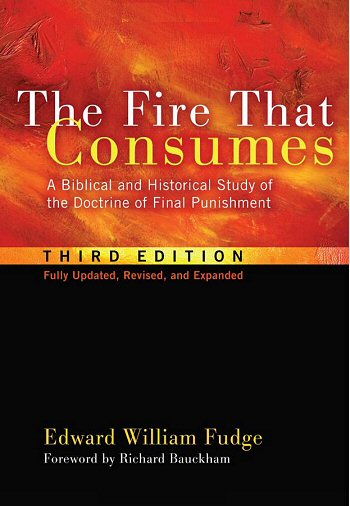
Thanks! I appreciate that. I recommend your readers purchase either Edward Fudge’s The Fire That Consumes, in its 3rd edition now with Wipf & Stock, or his Hell: A Final Word. The former is more scholarly; the latter more popular-level. They would also benefit from purchasing his two views book with Robert Peterson, Two Views on Hell. It’s available on Kindle for cheap, I think, and your readers will get both sides of the debate. I also highly recommend your readers keep an eye out for our upcoming Wipf & Stock publication, Rethinking Hell: Readings in Evangelical Conditionalism. They can learn more about it here: http://www.rethinkinghell.com/2013/12/rethinking-hell-book-announcement. It’s in the final stages of editing and we expect it to be published this Spring. It’s not yet available for preorder by itself, but if you have any readers that are anywhere near Houston, they can preorder a copy of our book as part of their registration for our inaugural Rethinking Hell Conference this July, which they can learn more about and register for here: http://www.rethinkinghellconference.com/2014/. And, of course, we have a bunch of resources available at http://www.rethinkinghell.com. There are a ton of articles on a variety of related issues, and for your readers not yet familiar with our view, they should probably start by listening to episode 4 of our podcast (http://www.rethinkinghell.com/2012/09/episode-4-the-case-for-annihilationism-with-glenn-peoples) in which Glenn Peoples gives a positive case for our view, and then episode 7 (http://www.rethinkinghell.com/2012/10/episode-7-traditional-objections-answered-with-chris-date) in which I answer common objections from traditionalists.

Alright Chris! Thank you for all the time you gave me, and I truly hope this was not too exhausting for you 🙂
You’re very welcome. I enjoyed it.













